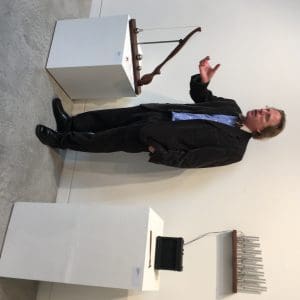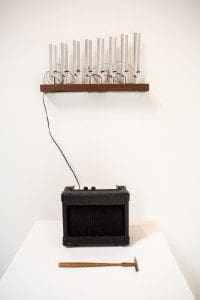 Recent years have seen tribal lines drawn across the globe, with an increasingly divisive and xenophobic political climate both in the United States and abroad. It’s a change in tenor we perhaps should have seen coming, but many of the most strident political analysts have been taken aback by the “Us vs. Them” rhetoric that has become so prevalent since the 2016 U.S. presidential election. Experimental philosopher Jonathon Keats, known for past endeavors such as the Pangaea Optima and Superego Suits, has proposed one idea for alleviating the current culture of hate: to turn our eyes – and ears – to the stars.
Recent years have seen tribal lines drawn across the globe, with an increasingly divisive and xenophobic political climate both in the United States and abroad. It’s a change in tenor we perhaps should have seen coming, but many of the most strident political analysts have been taken aback by the “Us vs. Them” rhetoric that has become so prevalent since the 2016 U.S. presidential election. Experimental philosopher Jonathon Keats, known for past endeavors such as the Pangaea Optima and Superego Suits, has proposed one idea for alleviating the current culture of hate: to turn our eyes – and ears – to the stars.
Of course, NASA and other space programs around the world have long since abandoned manned missions to deep space, but Keats has another notion entirely in mind, one that employs the universal language of music. The San Francisco artist has composed a Universal Anthem to be performed by several new constructions he has come to call alien instruments. “The Universal Anthem really is about inclusiveness at every level, which requires that beings other than humans have access to it,” Keats says, detailing the necessity for creating these instruments. “Therefore, all assumptions about sensory organs need to be called into question, and we need this much larger, more expansive view of what music can be made of, and what sorts of implements can be used to precisely modulate qualities of frequency and amplitude.”
The idea of utilizing music to achieve unity has been employed before, at least on a planetary scale. In 1971, the UN Secretary General U Thant commissioned a “Hymn to the United Nations” as an alternative to patriotic national anthems, but the hymn still relied on classical music structure and English lyrics—neither of which Keats finds ideal for achieving interstellar contact or fostering a sense of global unity. “What I care about in very tangible terms are the interactions happening on this planet right now, and those interactions are extraordinarily perilous at the level of geopolitics and the environment,” Keats explains. “I could go on and on as far as all the ways in which our tribalism and xenophobia are toxic, are ruinous. We need mechanisms for encouraging and facilitating inclusiveness in every possible way.”
As a result, Keats began his composition of the Universal Anthem by thinking about the Second Law of Thermodynamics, which states that everything in the universe must follow the rules of entropy, becoming more disorderly over time. Keats describes entropy as “the quality you would most trust to be universal.” Keats’s Universal Anthem “requires no knowledge of Wagnerian leitmotif, for instance,” and instead follows these same rules of entropy, with each voice gradually decomposing.
 Keats has created a visual transcription for the Universal Anthem, using – of all things – Adobe Photoshop and its noise generator. The resulting images resemble nothing so much as the static on an analog television or even the popular style of Internet art known as pixelart. But Keats insists this visual depiction is only one way to transcribe the Universal Anthem, and as with many popular forms of music, such as jazz, “it’s all open to interpretation.”
Keats has created a visual transcription for the Universal Anthem, using – of all things – Adobe Photoshop and its noise generator. The resulting images resemble nothing so much as the static on an analog television or even the popular style of Internet art known as pixelart. But Keats insists this visual depiction is only one way to transcribe the Universal Anthem, and as with many popular forms of music, such as jazz, “it’s all open to interpretation.”
Keats suggests there is great potential for entropy to be used as the basis for music; even songs by popular artists like Taylor Swift could be transcribed using his method. While Keats acknowledges that Swift could strike him with a potential lawsuit for disseminating her music into space, he argues that in helping her reach a potentially interstellar audience, she could be the first artist to go beyond Platinum sales to Universal—and, so, “Swift shouldn’t sue me, she should thank me.”
Composing music based on the law of entropy, Keats argues, could make music emotional on a galactic level, as all known creatures share a will to live and a fear of death. This style of music could “broaden the gamut of what we know” and allow those of us on Earth to “become a small part of something greater.” Keats hopes “this de-centering might help counteract some of the xenophobia that is rampant in the United States and Europe,” and bring about “the kind of massive generalized introspection that is going to be necessary to overcome this tribalism.”
 But, how then, best to perform these compositions? It’s difficult to imagine strumming a guitar onstage and expecting those same notes, no matter how amplified, to reach extraterrestrial ears. To that end, Keats has devised several quite beautiful and intricate “alien instruments,” which are currently viewable upon appointment at the Modernism Gallery in San Francisco. These instruments include Gravitational Rattles, which appear to be standard variety potatoes you could find at your local Trader Joe’s – and, indeed, they are. But these potatoes also allow the performers to alter their gravitational mass at will, depending on how many they hold in their hands (or juggle, as one man did to the delight of onlookers at the opening night of Keats’ exhibit). “If we’re going to make instruments that include not only what is audible to humans but also gravitational waves, it makes the distance between us and those south of the border seem all that much more minimal,” Keats says. He hopes a renewed musical understanding could ultimately help foster “the sort of cooperation we need in order to get on as a society, as a species, and as a planet.”
But, how then, best to perform these compositions? It’s difficult to imagine strumming a guitar onstage and expecting those same notes, no matter how amplified, to reach extraterrestrial ears. To that end, Keats has devised several quite beautiful and intricate “alien instruments,” which are currently viewable upon appointment at the Modernism Gallery in San Francisco. These instruments include Gravitational Rattles, which appear to be standard variety potatoes you could find at your local Trader Joe’s – and, indeed, they are. But these potatoes also allow the performers to alter their gravitational mass at will, depending on how many they hold in their hands (or juggle, as one man did to the delight of onlookers at the opening night of Keats’ exhibit). “If we’re going to make instruments that include not only what is audible to humans but also gravitational waves, it makes the distance between us and those south of the border seem all that much more minimal,” Keats says. He hopes a renewed musical understanding could ultimately help foster “the sort of cooperation we need in order to get on as a society, as a species, and as a planet.”
On the off chance these aliens boast superior hearing ability to humans, Keats has created the Ultrasonic Organ, which replaces conventional organ pipes with dog whistles. Most humans cannot hear past 20,000 hertz on the audible spectrum; dogs can hear as high as 45 kilohertz, making the Ultrasonic Organ ideal for reaching distant beings with hearing more in line with our canine companions. Much like a traditional organ, the Ultrasonic Organ’s airflow can be modulated by a foot bellow.
Keats has also constructed the Gamma Ray Bells, whose gamma ray exposure can be controlled by the performer simply by lifting the bell’s lead casing. It’s worth mentioning that gamma rays fall outside the normal human sensory range, but their type of electromagnetic radiation might just be the ideal vehicle to reach certain species currently unknown to us. One has to wonder, then, if the ideal instrumentation for the Universal Anthem might be one that human beings can’t even experience?
 Keats argues such an idea goes entirely against the Universal Anthem’s goal of inclusiveness and harmony: “We desperately need humans to be part of this interaction, part of this communication, part of this musical phenomenon, as well as any other organisms,” he states. “First of all because we only know of us, so it makes sense to include us, and secondly because, well, I happen to be human—as far as I know.”
Keats argues such an idea goes entirely against the Universal Anthem’s goal of inclusiveness and harmony: “We desperately need humans to be part of this interaction, part of this communication, part of this musical phenomenon, as well as any other organisms,” he states. “First of all because we only know of us, so it makes sense to include us, and secondly because, well, I happen to be human—as far as I know.”
Despite creating this attractive array of intergalactic instruments, Keats freely admits he approaches this project with little to no musical training. “I studied recorder in fourth grade,” he says. “One semester I learned how to play and then over break I forgot, and so for the second semester I simply didn’t blow into the instrument. That was my first and last experience with any instrument at all.” Even so, Keats has put a great deal of time into informally studying musical theory, as well as astrophysics and the various other components of this endeavor.
Keats does not see his lack of formal proficiency as a hindrance or liability: “I think in everything that I do I rely on the fact that I am ultimately a generalist, a dilettante, a charlatan,” he relates. “I am not bound by any rules, though I certainly make myself aware of the rules in the process of exploring ideas.”
In many ways, Keats’ insistence that a lack of musical training should serve as no detriment to playing these instruments brings to mind the punk rock movement of the late ’70s, which encouraged passionate neophytes to pick up a second-hand guitar or bass and bash their way to a connection with a live audience. “I like the idea that this is a kind of punk tradition that we’re talking about here, when we talk about making music with aliens,” he says.
He also cites post-war avant-garde musician John Cage, whose work utilized a sense of chaos and order not dissimilar to entropy, as a major influence. “I once composed a ringtone that was a remix of John Cage’s 4’33.” My version was a 4-minute-and-33-second long silent ringtone, such that you never knew when your phone was ringing,” he explains. “As a result, you might imagine that it was ringing even when it wasn’t, and you would have this sort of phantom silence, which might even be more pure than the digital silence I generated for the ringtone. We need more silence in the ever noisier world in which we live.”
Keats’ appreciation of Cage reiterates that these instruments are meant to be as accessible as possible. “Certainly some musical training could be helpful,” he states, “but it also might get in the way.” Instead, performers could “enter into a tacit acceptance of unknowability” and experience “a state of not knowing together,” which could actually be “a great basis for a dialogue that doesn’t have any of the power dynamics or structure that typically informs the conversations we have.”
 While Keats has composed the Universal Anthem as a starting point, he insists these instruments lend themselves freely to improvisation. “Improvisation is probably more powerful, ultimately,” he states, “and maybe the practice of composing is really practice for improvisation.” Improvisation proves so integral to Keats’ view precisely because “that’s where you have true interaction.” Interaction being a potent remedy to the culture of hate we have become mired in: “The Trumpian strategy is maybe undermined when there are so many ways in which communication is happening, ways that are so complex and so intertwined and so rich that any attempt to pit ‘us’ against ‘them’ is made impossible, and, in fact, ‘us’ and ‘them’ become indefinable.”
While Keats has composed the Universal Anthem as a starting point, he insists these instruments lend themselves freely to improvisation. “Improvisation is probably more powerful, ultimately,” he states, “and maybe the practice of composing is really practice for improvisation.” Improvisation proves so integral to Keats’ view precisely because “that’s where you have true interaction.” Interaction being a potent remedy to the culture of hate we have become mired in: “The Trumpian strategy is maybe undermined when there are so many ways in which communication is happening, ways that are so complex and so intertwined and so rich that any attempt to pit ‘us’ against ‘them’ is made impossible, and, in fact, ‘us’ and ‘them’ become indefinable.”
Naturally, the notion of jamming out with interstellar beings conjures so many moments from science-fiction movies, whether it’s the iconic cantina band from Star Wars or the blue-skinned opera singer in Luc Besson’s The Fifth Element, but Keats insists that no aliens yet depicted on film come close to his perception of hypothetical extraterrestrials. “In some cases, like Plan 9 from Outer Space, [the alien is] more hostile or intimidating, and in others, like E.T., it’s more sympathetic, but it’s always Other. It’s always about the difference as opposed to the similarities.” Keats’ project doesn’t hone in on these perceived differences, but rather imagines all the ways we could be alike: embracing a depiction of aliens “where you can’t tell who is who, or where the differentiation is the least of it rather than the most if it.” Given the gorgeously crafted aesthetic of Keats’ instruments, it comes as little surprise that Keats is willing to loan out the instruments as props in film productions. “I would love to see how these instruments and this kind of music might bend the assumptions of science fiction,” he admits.
Beyond appearing at a theater near you, Keats hopes his instruments may one day come closer to achieving their intended purpose by being standard issue equipment onboard future space shuttle launches. “Any mission whatsoever to space, amongst the other equipment that should be onboard the spacecraft, certainly these musical instruments should be part of the gear,” he says. “You never know, you want to be prepared.” And Keats is nothing less than prepared for a potential day in the future where the human voice and mass will intermingle and perform with beings whose experience of music and the universe might, in truth, be closer to our own than we ever imagined.
